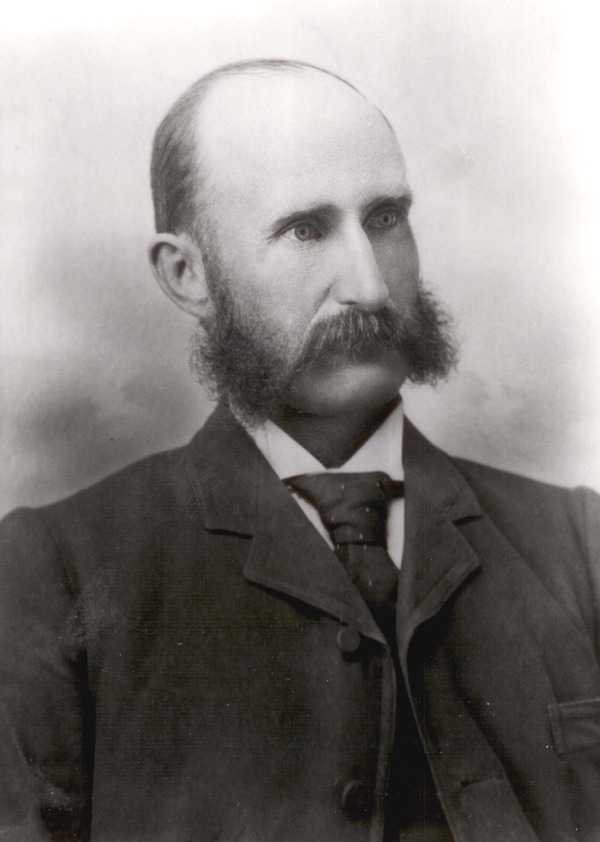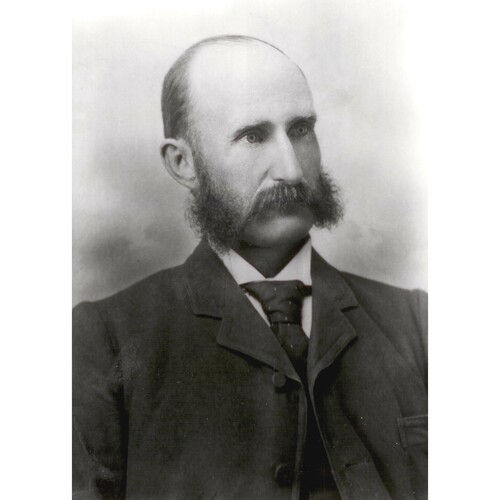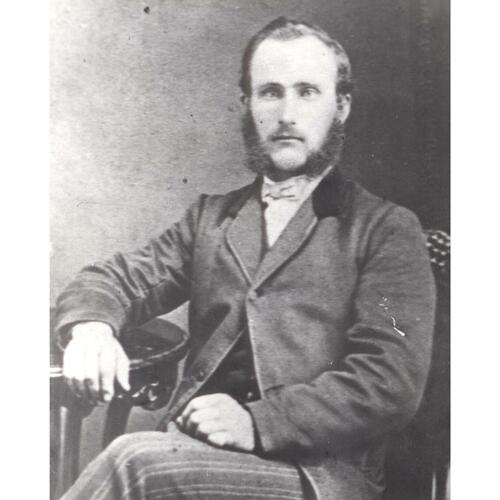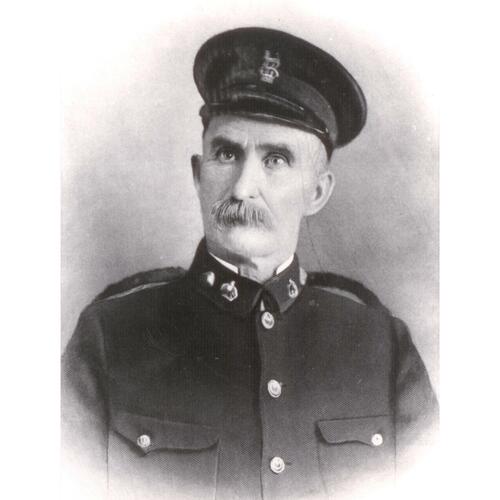
Source: Courtesy of Wikimedia Commons
McCAULEY, MATTHEW, businessman, farmer, politician, and penitentiary warden; b. 11 June 1850 near Sydenham (Owen Sound), Upper Canada, son of Alexander McCauley and Eleanor Latimer; m. first 1875 Matilda Susannah Benson (d. 1896) in Winnipeg, and they had two sons and six daughters; m. secondly 27 March 1900 Annie Cookson in Edmonton, and they had two daughters and two sons; d. 26 Oct. 1930 near Sexsmith, Alta.
Matt McCauley grew up on a farm near Owen Sound, but at the age of 21 he left Ontario for Upper Fort Garry (Winnipeg), where he worked at various jobs until he established a cartage business in 1874. Five years later he and his family travelled by ox cart to Fort Edmonton (Edmonton) and took up a farm near Fort Saskatchewan (Alta). They moved into Edmonton in 1881. There McCauley established the business that would become the Edmonton Cartage Company.
Over the following three decades he would involve himself in virtually every aspect of public life in the small but growing community. He helped to establish and served on the public school board, was a member of the Home Guard during the 1885 uprising led by Louis Riel*, founded the Edmonton Board of Trade and the Edmonton Agricultural Society, served as the first mayor for the town of Edmonton and as a councillor, sat in the territorial and provincial assemblies, and eventually became warden of the Alberta penitentiary. He was also involved with the masonic lodge and a founder of the Royal Curling Club.
In 1881 McCauley was the driving force behind the establishment of the first public school in the community. With the support of Frank Oliver*, editor of the Edmonton Bulletin, he persuaded the Hudson’s Bay Company to provide a lot for the school and raised funds by subscription to pay for its construction and the teacher’s salary. He and the other trustees constantly found themselves short of money, however, as the territorial school grants and residents’ pledges failed to materialize. The citizens resorted to organizing minstrel shows and renting out the school to raise the money needed to settle with the contractor, buy supplies, and lease a heater.
The North-West Territories School Ordinance of 1884 made it possible for the residents of Edmonton to establish a public school district, and a plebiscite to approve its incorporation was held on 21 December that year. Despite the support of local leaders such as McCauley and Oliver, there was considerable opposition from the HBC and other large landowners, who did not wish to pay taxes to support a public school. Both sides put considerable effort and ingenuity into getting voters out for the plebiscite. In the end, returning officer McCauley was pleased to announce the results: 54 votes to 43 in favour of incorporation. He would serve as chairman of the board or trustee for 15 years.
McCauley’s involvement in a public vigilance committee in 1882 helped to further his reputation as a champion of local residents. By this time several settlers had built houses along the cliffs overlooking the North Saskatchewan River, but because the federal government had not completed a survey, they could not establish legal title to the land they occupied. Newcomers to the settlement started to build on land that was already occupied and resisted attempts to persuade them to move elsewhere. McCauley and some others therefore took matters into their own hands and threw the newly built shacks over the cliffs into the valley below.
In 1892, when the town of Edmonton was incorporated, McCauley was chosen its first mayor by acclamation; he was re-elected in 1893 and 1894. The burning issue in these years was the need for a railway link. The Canadian Pacific Railway had bypassed Edmonton when it took a southern route through the territory, and the Calgary and Edmonton Railway, which had been intended to connect the two towns, terminated at Strathcona (now southern Edmonton) in 1891, failing to cross the North Saskatchewan River. Mayor McCauley went to Ottawa three years later and lobbied politicians on both sides of the House of Commons to support the construction of a bridge over the river. It was finally completed in 1900.
Meanwhile, community leaders in Strathcona argued that because the railway ended there, the other services required by settlers arriving in the area, including the dominion land titles office, should be moved from Jasper Avenue in Edmonton to Strathcona. On 18 June 1892 McCauley called up a “home guard” and surrounded the land agent and his men, who were in the midst of moving the office to the south side of the river. He and his supporters forced a delay by unhitching the horses and removing the wagon’s wheels. Telegrams were sent to Edgar Dewdney*, the minister of the interior in Ottawa, demanding that the order to move the office be rescinded. Dewdney initially responded by directing Superintendent Arthur Henry Griesbach of the North-West Mounted Police to take his troop from Fort Saskatchewan to Edmonton and effect the removal, but McCauley met the detachment and reiterated his demand for more time. On 20 June he received a telegram from Dewdney assuring him that it had never been the government’s intention to move the office permanently, only to set up a temporary branch in Strathcona to deal with the expected influx of new settlers. The office remained on Jasper Avenue, and McCauley reinforced his reputation as a stern defender of the interests of Edmonton’s citizens. He maintained this position while serving as the Liberal member for Edmonton in the Legislative Assembly of the North-West Territories from 1896 to 1902.
In the latter year McCauley and his family left the town to take up a farm near Tofield, but he was drawn back into politics when the province of Alberta was created in 1905. He was persuaded to run for the Vermilion district northeast of Edmonton and won the seat. However, he served only during the first session and then was rewarded for his loyalty to the Liberals by being appointed warden of the Alberta penitentiary, established in Edmonton the following year. As warden, McCauley worked to make the facility largely self-sufficient. By 1908 prisoners were manufacturing bricks and crushing stone for concrete. They were also making their own clothing, shoes, and tools, and gardening and producing much of their own food. Two years later the prison had its own coalmine.
Following the election of a Conservative government in Ottawa in 1911, McCauley lost his position as warden of the penitentiary. He moved to Penticton, B.C., where he ran an orchard for 14 years. Then at the age of 75 he took up a homestead in the Peace River district of Alberta near Sexsmith. He died there at the age of 80 and was buried in Edmonton. A public school and a plaza in the city are named in his honour.
Alta Legislature Library (Edmonton), Scrapbook Hansard, March–May 1906 (mfm.). City of Edmonton Arch., MS 320 (Matt McCauley fonds); Newspaper clipping files, Edmonton Penitentiary clippings; Matt McCauley clippings; RG 8 (Edmonton Town Council), minute-books, 1892–94. Edmonton Public Schools Arch. and Museum, Edmonton School District No.7 fonds, reference file: McCauley, Matthew, minute-books, 1885–1902. Jim Blower, “Matthew McCauley,” Alberta Hist. Rev. (Calgary), 20 (1972), no.1: 11–17. M. A. Kostek, A century and ten: the history of Edmonton public schools (Edmonton, 1992). J. G. MacGregor, Edmonton: a history (Edmonton, 1967; 2nd ed., 1975). Alex Mair, Gateway city (Calgary, 2000). North-West Territories, Legislative Assembly, Journals (Regina), 1896–1902.
Cite This Article
Amy von Heyking, “McCAULEY, MATTHEW,” in Dictionary of Canadian Biography, vol. 15, University of Toronto/Université Laval, 2003–, accessed December 30, 2025, https://www.biographi.ca/en/bio/mccauley_matthew_15E.html.
The citation above shows the format for footnotes and endnotes according to the Chicago manual of style (16th edition). Information to be used in other citation formats:
| Permalink: | https://www.biographi.ca/en/bio/mccauley_matthew_15E.html |
| Author of Article: | Amy von Heyking |
| Title of Article: | McCAULEY, MATTHEW |
| Publication Name: | Dictionary of Canadian Biography, vol. 15 |
| Publisher: | University of Toronto/Université Laval |
| Year of publication: | 2005 |
| Year of revision: | 2005 |
| Access Date: | December 30, 2025 |





